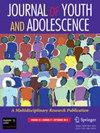Associations between Family Ethnic-Racial Socialization and Ethnic-Racial Identity Centrality among Black and Latine Youth.
IF 3.6
1区 心理学
Q1 PSYCHOLOGY, DEVELOPMENTAL
引用次数: 0
Abstract
Ethnic-racial identity development is a key developmental task that contributes to positive youth outcomes across a variety of domains. Families play an integral role in adolescents' ethnic-racial identity development through the ways they teach their children about their ethnic-racial backgrounds. Research supports that youth who report high levels of family ethnic-racial socialization concurrently report high levels of ethnic-racial identity centrality, a facet of youth's ethnic-racial identity that shapes their self-concept and experiences. However, there is less research examining how ethnic-racial socialization and centrality relate to one another over time, limiting the field's understanding of how youth's centrality evolves as they are socialized and are active agents of their own development. This study analyzes the interrelations between cultural socialization, a form of family ethnic-racial socialization, and centrality over one year across three waves of data collection. Participants were 2153 Black and Latine high school students from the Southwest and Midwest U.S. (Mage = 15.91; SDage = 1.17; 57% Black; 44% boys, 54% girls, 2% another gender). Results from multigroup cross-lagged panel modeling indicated that, across groups, higher cultural socialization was associated with a positive change in centrality, but not vice versa. Findings highlight how the family context supports the progressive development of youth's emerging beliefs about their ethnic-racial identities.黑人和拉丁裔青年家庭种族-种族社会化与种族-种族认同中心性的关系。
民族-种族认同的发展是一项关键的发展任务,有助于在各个领域取得积极的青年成果。家庭在青少年种族认同的发展中扮演着不可或缺的角色,他们通过教育孩子他们的种族背景。研究表明,报告高水平家庭种族-种族社会化的年轻人同时报告高水平的种族-种族身份中心性,这是青年种族-种族身份的一个方面,塑造了他们的自我概念和经历。然而,研究族裔-种族社会化和中心性如何随着时间的推移相互关联的研究较少,这限制了该领域对青年中心性如何随着他们的社会化和自身发展的积极因素而演变的理解。本研究通过三波数据收集,分析了文化社会化(一种家庭族群-种族社会化形式)与中心性之间的相互关系。参与者是来自美国西南部和中西部的2153名黑人和拉丁裔高中生(Mage = 15.91; SDage = 1.17; 57%的黑人;44%的男孩,54%的女孩,2%的其他性别)。多群体交叉滞后面板模型的结果表明,在不同群体中,较高的文化社会化与中心性的积极变化相关,反之则不然。研究结果强调了家庭背景如何支持青年对其种族认同的新兴信念的逐步发展。
本文章由计算机程序翻译,如有差异,请以英文原文为准。
求助全文
约1分钟内获得全文
求助全文
来源期刊

Journal of Youth and Adolescence
PSYCHOLOGY, DEVELOPMENTAL-
CiteScore
8.20
自引率
6.10%
发文量
155
期刊介绍:
Journal of Youth and Adolescence provides a single, high-level medium of communication for psychologists, psychiatrists, biologists, criminologists, educators, and researchers in many other allied disciplines who address the subject of youth and adolescence. The journal publishes quantitative analyses, theoretical papers, and comprehensive review articles. The journal especially welcomes empirically rigorous papers that take policy implications seriously. Research need not have been designed to address policy needs, but manuscripts must address implications for the manner society formally (e.g., through laws, policies or regulations) or informally (e.g., through parents, peers, and social institutions) responds to the period of youth and adolescence.
 求助内容:
求助内容: 应助结果提醒方式:
应助结果提醒方式:


